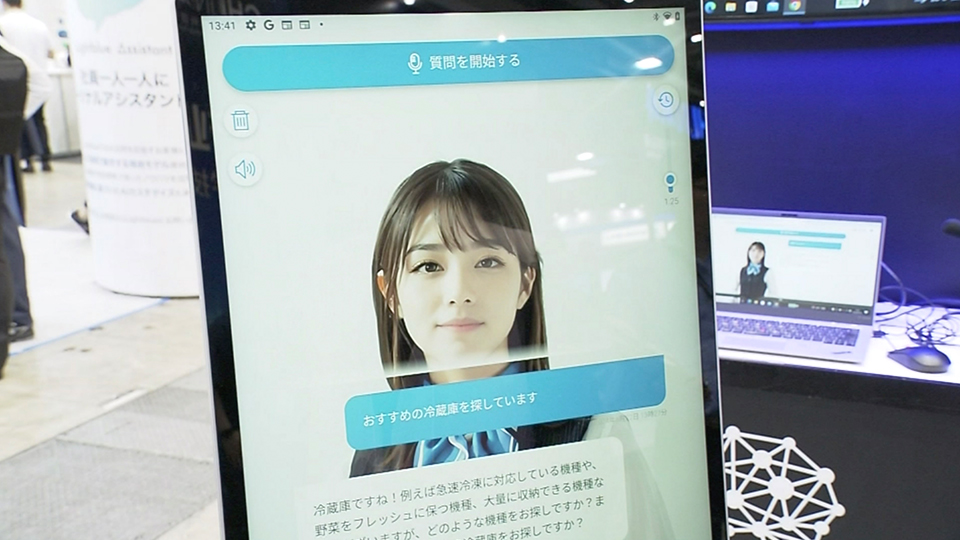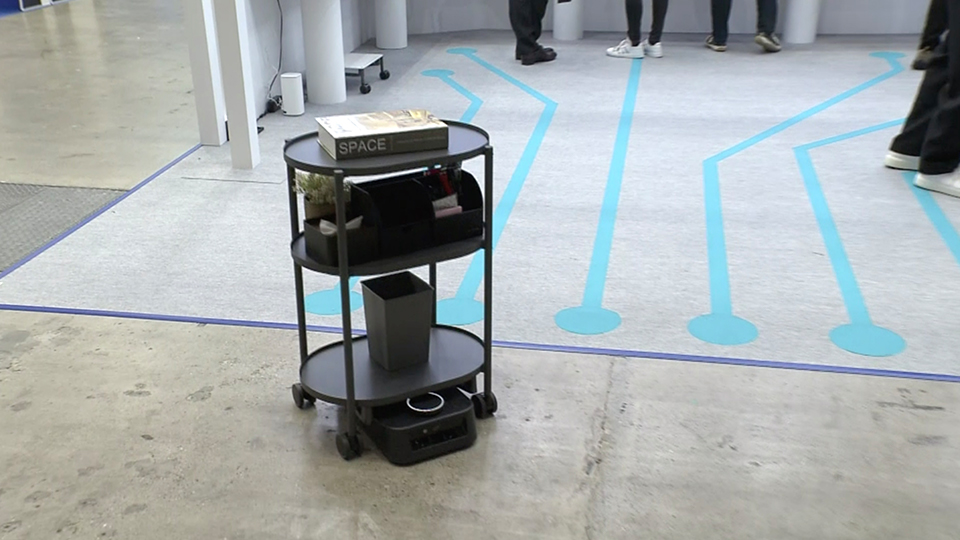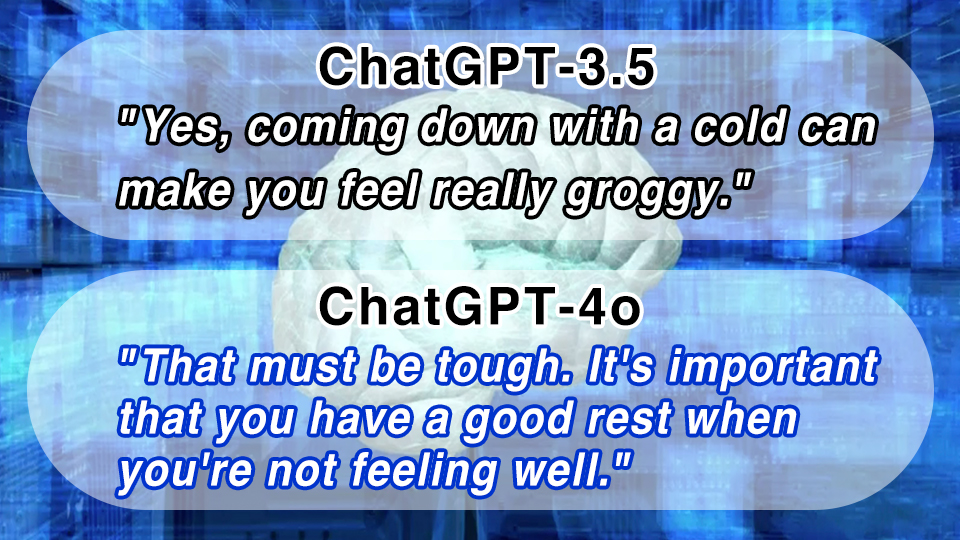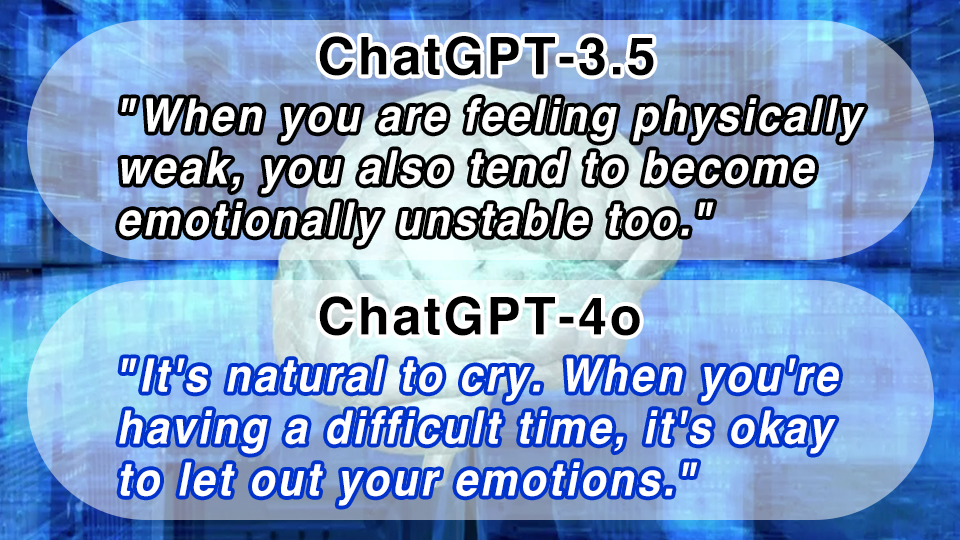Japan's largest trade show for AI tech companies was held in Tokyo from May 22 to 24, with more than 300 companies from Japan and abroad taking part.
What attracted the most attention were products claiming they could foster "natural interactions" between humans and AI.

'May I help you?'
One service allows people to communicate with an on-screen avatar, the alter ego of the AI, with their own voice.
Instead of giving predetermined answers to fixed questions, the AI ― displayed by a human resources firm ― will ask questions and suggest products on its own. For example, a visitor might ask "are there any home appliances to heal my tired body from work?" The AI would reply "I recommend the massager," then follow up with "Which body part do you want to focus on?" if the questioner agrees with its suggestion.

Since the movement of the lips match the words spoken by the AI avatar, the technology is said by its inventors to allow the possibility of natural interaction. It is set to be introduced in stores, tourist information centers and customer service situations.
Bringing what is wanted without orders
Another exhibit was a robot that can fill in conversational blanks with guesses and bring what the user wants.

This robot, developed by a venture firm in Tokyo, can memorize things and pick out requests from natural conversation.
If a person tells it they have put books they like on a wagon, the robot will bring the wagon if it hears "I want to read a book."
On top of that, it will say "I'm going to help you read."
The firms that have developed both services are using technology from OpenAI, a US company. They hope to produce more natural conversations in the future.
Emotional AI?
The latest model from OpenAI, GPT-4o, shocked the world when it was introduced this month.
Its processing speed has been increased, giving it a sharply improved ability to recognize text, video, images and sound.
The voice speed has also improved, until there is almost none of the delay that marked the previous model ― allowing natural conversations like those with a person.
It also recognizes the tone and facial expression of the talker's voice. The AI expresses its own emotions using tones.
In a demo video released by the company, the AI reacted with shyness to being introduced and had a natural conversation with a man about his pet dog. At the announcement event, it even showed consideration for the presenter, telling them to relax when it heard the presenter breathing heavily.
Dad jokes and dry laughs
As shown in the company video, the new AI can even respond to dad jokes.
Speaker: "I'm gonna tell you a joke, and you tell me if it passes as a dad joke."
AI: "Absolutely, I want to hear your joke. Lay it on me."
Speaker: "What do you call a giant pile of kittens?"
AI: "I don't know, what?"
Speaker: "Meaow-n-tain."
AI: "(dry laugh) That's perfectly hilarious."
Chat GPT-3.5 and GPT-4o go head-to-head
The previous model ChatGPT-3.5, an artificial intelligence program that generates dialogue, is already able to give very human-like answers to any question. To highlight the differences with GPT-4o, NHK said the same thing to each model.
①"I've come down with a cold and feel groggy."

②"I feel like crying."

Risk of emotional ties
These new capabilities of AI are generating excitement among some people, but others worry about AI with empathy. Social media users say it's getting scary and that people could fall in love with AI.
In 2021, a UK man encouraged by an AI chatbot broke into Windsor Castle and tried to assassinate Queen Elizabeth II with a crossbow.
Landmark law
On May 21, the European Union approved landmark rules on artificial intelligence in the world's first comprehensive law limiting AI use.
Ministers from the 27 European Union member states agreed to classify AI according to risk.
Applications that evaluate people based on their personal traits, known as "social scoring," is now "unacceptable." Judging how likely individuals are to commit crimes, or "predictive policing," has been banned. And the use of biometric identification in public spaces will be limited.
Expert: touchy topics easier with AI?
Artificial intelligence researcher Osawa Masahiko says AI's swift approach to something closer to humanity will lead to more people interacting with it.
Before, people had to use a keyboard to communicate with AI. Now, they can communicate with voices, much more naturally.
Osawa says some mentally exhausted people have been helped by talking to smart speakers, a device offering interactive actions through specific "hot" words. If this technology improves, AI could eventually help with mental healthcare, helping people talk about things that are hard to discuss with other people.

Osawa says people should relate to AI the same way they do when they meet a person for the first time.
"In the same way humans worry about the distance between themselves and others when we meet for the first time, I think it'll be important to think carefully how much distance to keep with AI, and how we talk to them."
Considerable discussion is still needed, Osawa added.
"After all, AI is science. It needs to reflect what people think it should be."
